Collie Adventure Trails
Sign Up For Our Newsletter
A world class mountain biking hub in and around Collie, featuring over 100km of new trails and enhanced facilities.
ABOUT THE PROJECT
The $10 million Collie Adventure Trails initiative will establish Collie as a premier ‘trail adventure town’ to attract local, national and international mountain bike and bushwalking tourists, and support the local economy.
Located 213 kilometres from Perth’s CBD and 60 kilometres from Bunbury, Collie has long been popular for adventure camping, water skiing and outdoor activities. Now, thanks to a $10 million State Government investment, Collie is set to become home to a world-class network of trails that will guide mountain bike riders and bushwalkers to explore more of the area.
Collie’s topography and landscape provide mountain bike riders with an array of areas to enjoy and challenges to tackle. The spectacular Collie River, which stretches from the town through Westralia Conservation Park and Wellington National Park; imposing granite outcrops; lush vegetation; and steep and varied natural features create an ideal foundation on which to build the world-class trails network.
The initiative will develop new trails and facilities that will showcase the area’s natural landscapes and cultural heritage, and make a significant economic contribution to the region.
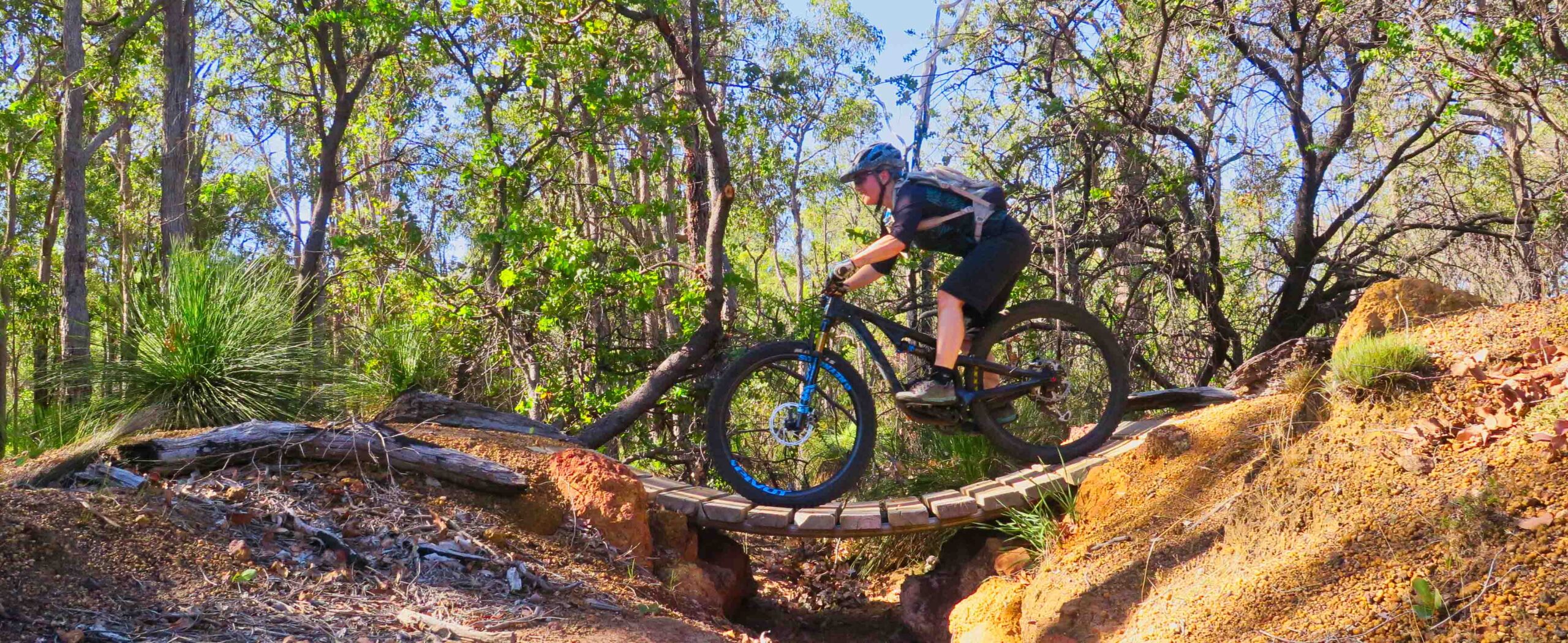
Photos copyright Frances Andrijich (top of page) and MTBGuidebook.com (above)
DEVELOPING A BRAND
Part of the CAT project is to develop a trails brand for Collie that will be used in marketing, promotion and that sets the tone and voice of the brand/trails. A strong brand has been an important component of successful trail destinations elsewhere in Australia and around the world. While Collie Adventure Trails has been the project working title, the brand development process has come up with a new name, logo and brand.
Local design
Parks and Wildlife Service contracted a local Collie design and marketing company to assist in developing the trails brand and through a series of workshops and co-design with the community, the Collie trails brand has emerged. The brand and logo aim to express the unique personality of Collie as an emerging trail town.
Wambenger Trails
The brand name for the Collie trails is Wambenger Trails, Collie Western Australia.
Wambenger, or the brush-tailed phascogale, is a small native marsupial relatively common in the Jarrah forests around Collie and is not well known, but full of energy and spirit – just like the people of Collie. The logo is a stylised Wambenger.
The brand will be used in marketing, promotion and will set the tone and voice of the Collie trails. The brand and logo aim to express the unique personality of Collie and to capture the vision, values and purpose of Collie trails.
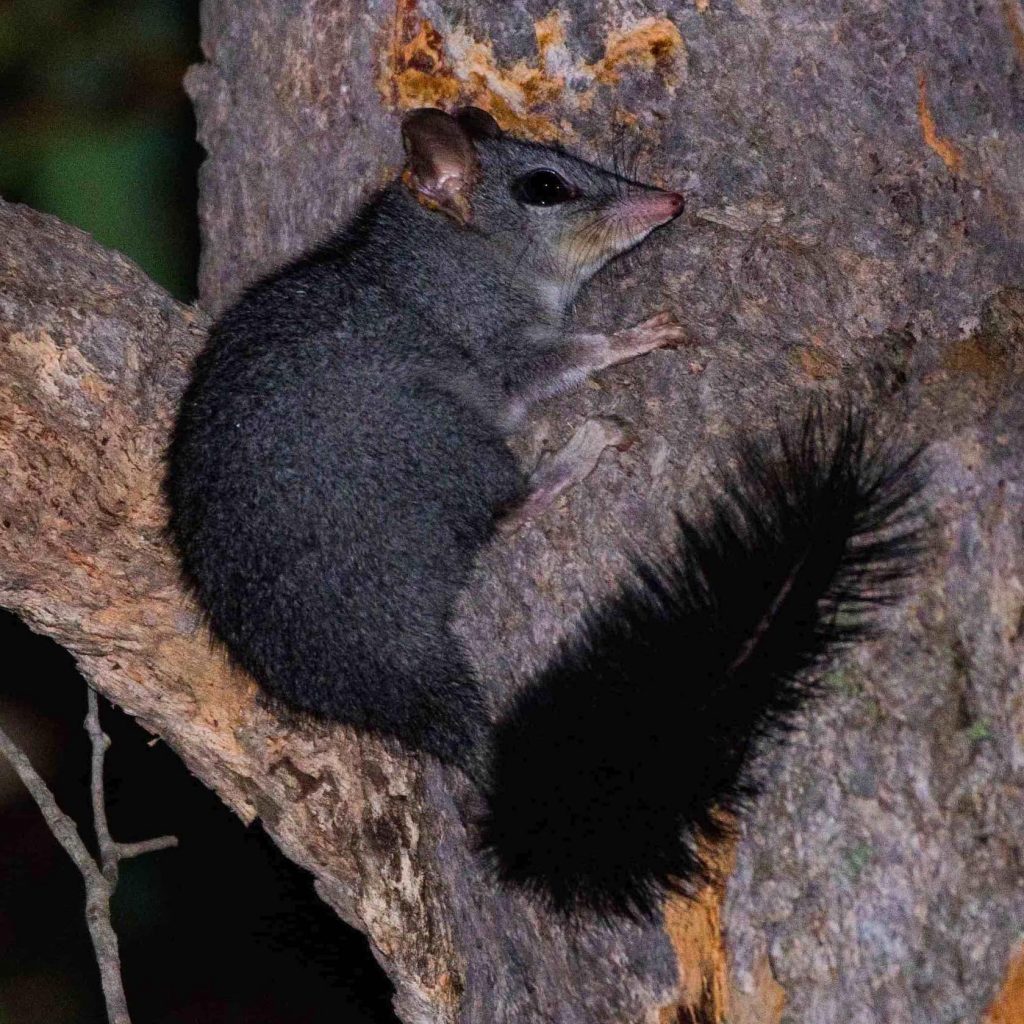
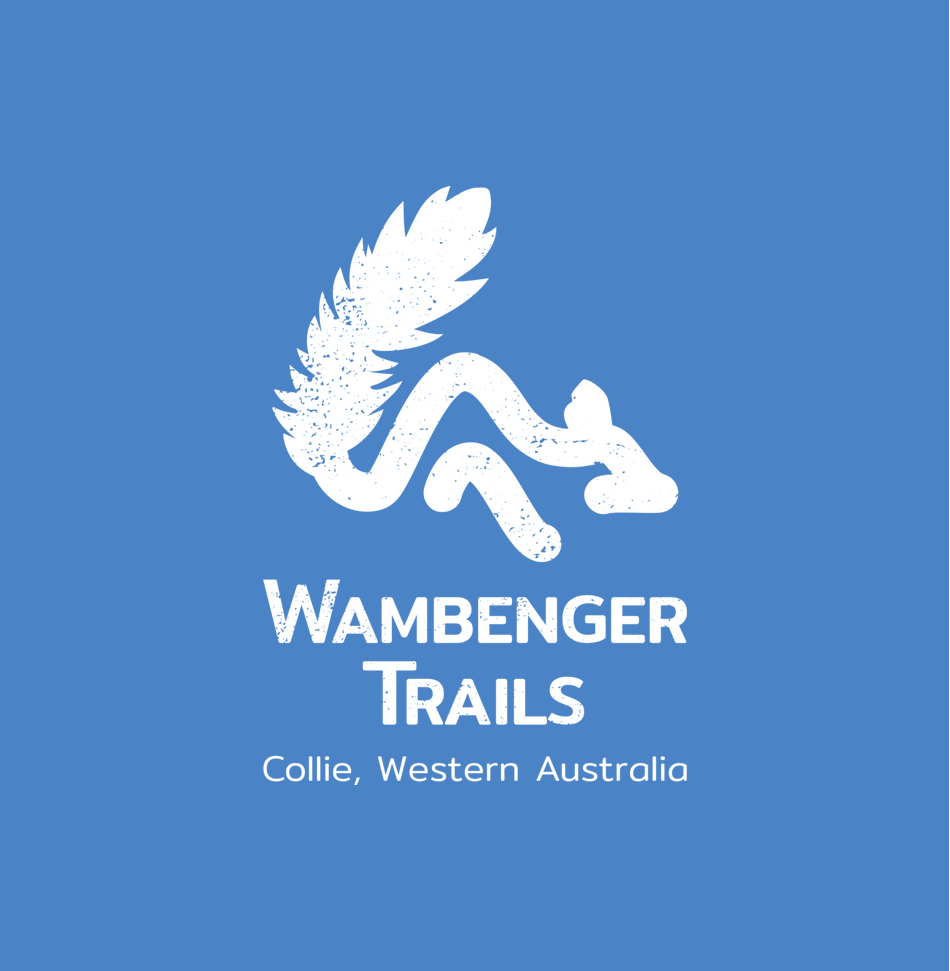
TRAILS AND FACILITIES
The Collie Adventure Trails initiative includes:
- Construction of a 65km network of high-quality, dedicated mountain bike trails in Wellington National Park.
- Development of a 35km world-class trails network at Westralia Conservation Park with the ability to access the trails direct from the Collie town centre.
- 11km of new mountain bike trails in Arklow Forest Block, located north of Collie.
- A river crossing at Westralia Conservation Park that will enable trails along both sides of the spectacular Collie River Valley.
- A 50km addition to the Wiilman Bilya walk trail to provide hikers with a five-day hiking loop around Wellington Dam, or shorter day options that start and finish in the Collie town centre.
- A 20km realignment of the long-distance Munda Biddi Trail linking Wellington National Park with Collie.
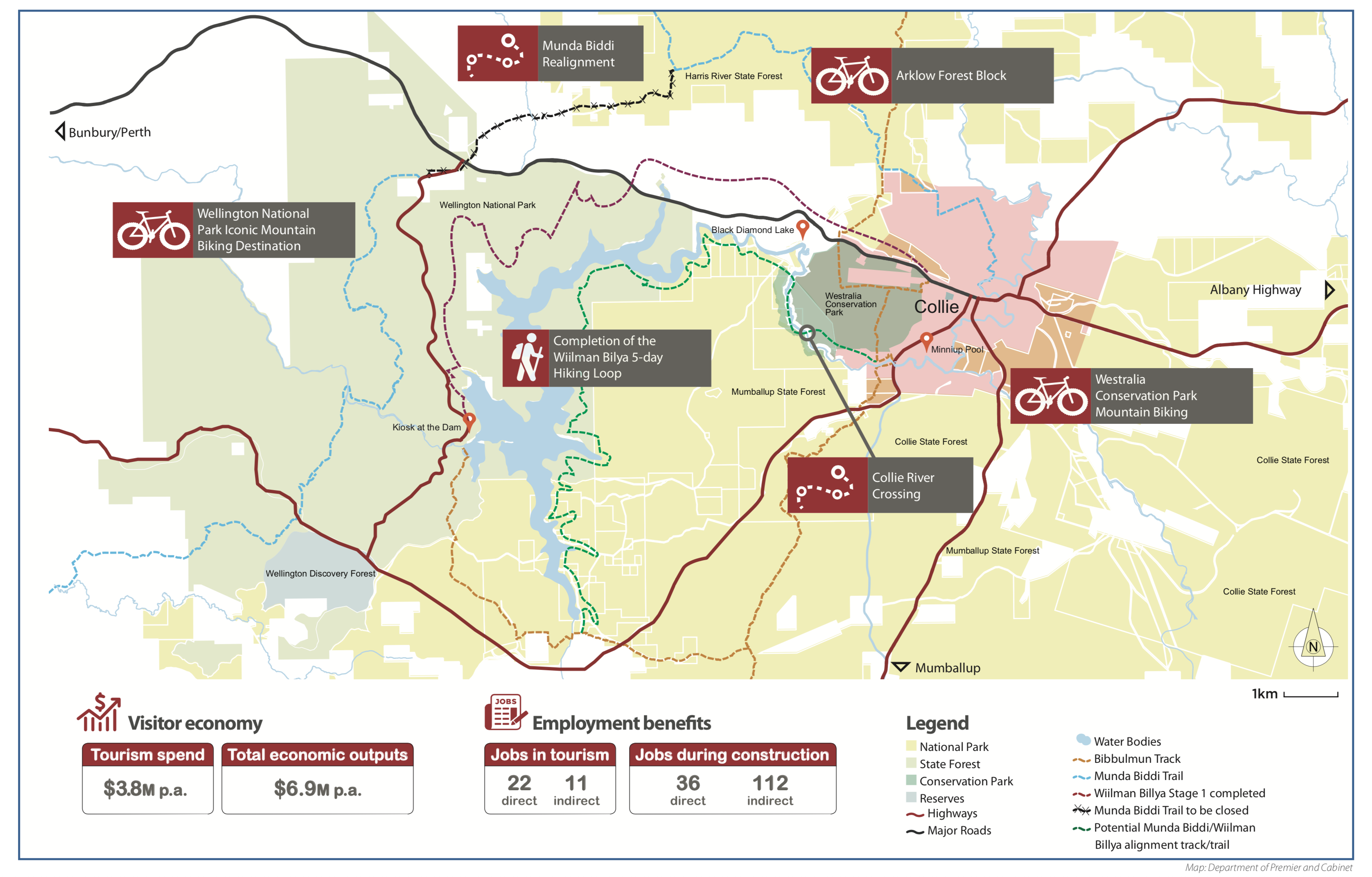
The new trail network in Wellington National Park will include ‘epic’ standard trails, suitable for hosting national and international events. The area chosen for the trails in Wellington National Park will guide users through spectacular scenery and offer height differences of up to 200 metres along the valley chasm.
The trails network at Westralia Conservation Park will take riders from Collie town centre past some of the most iconic scenery in the region, including to Black Diamond Lake and Minninup Pool. A river crossing at Westralia Conservation Park will support the local mountain bike and walk trails by enabling trails along both sides of the spectacular Collie River Valley.
Trails being developed for Arklow Forest Block will complement recently built trails and provide a network suitable for a range of riders from beginners to advanced, as well as users of handcycles.
Each year 50,000 riders use the iconic Munda Biddi Trail, which journeys 1000 kilometres from Mundaring to Albany. The realignment will enhance the experience by diverting the trail off sealed roads and into bush areas. It will also provide opportunities for multi-day cycling loop tours and encourage users to take advantage of the local tourism opportunities.
The extension of the Wiilman Bilya walk trail will take hikers along the Collie River into Wellington National Park and then around the Wellington Dam, the largest reservoir in the south-west. It will also connect with Western Australia’s premier walking trail – the Bibbulmun Track.
TIMELINE
The Collie Adventure Trails Project commenced in May 2019 with trail construction works in Arklow Forest Block. The remaining trail and infrastructure works will be progressively delivered in stages over the next four years.
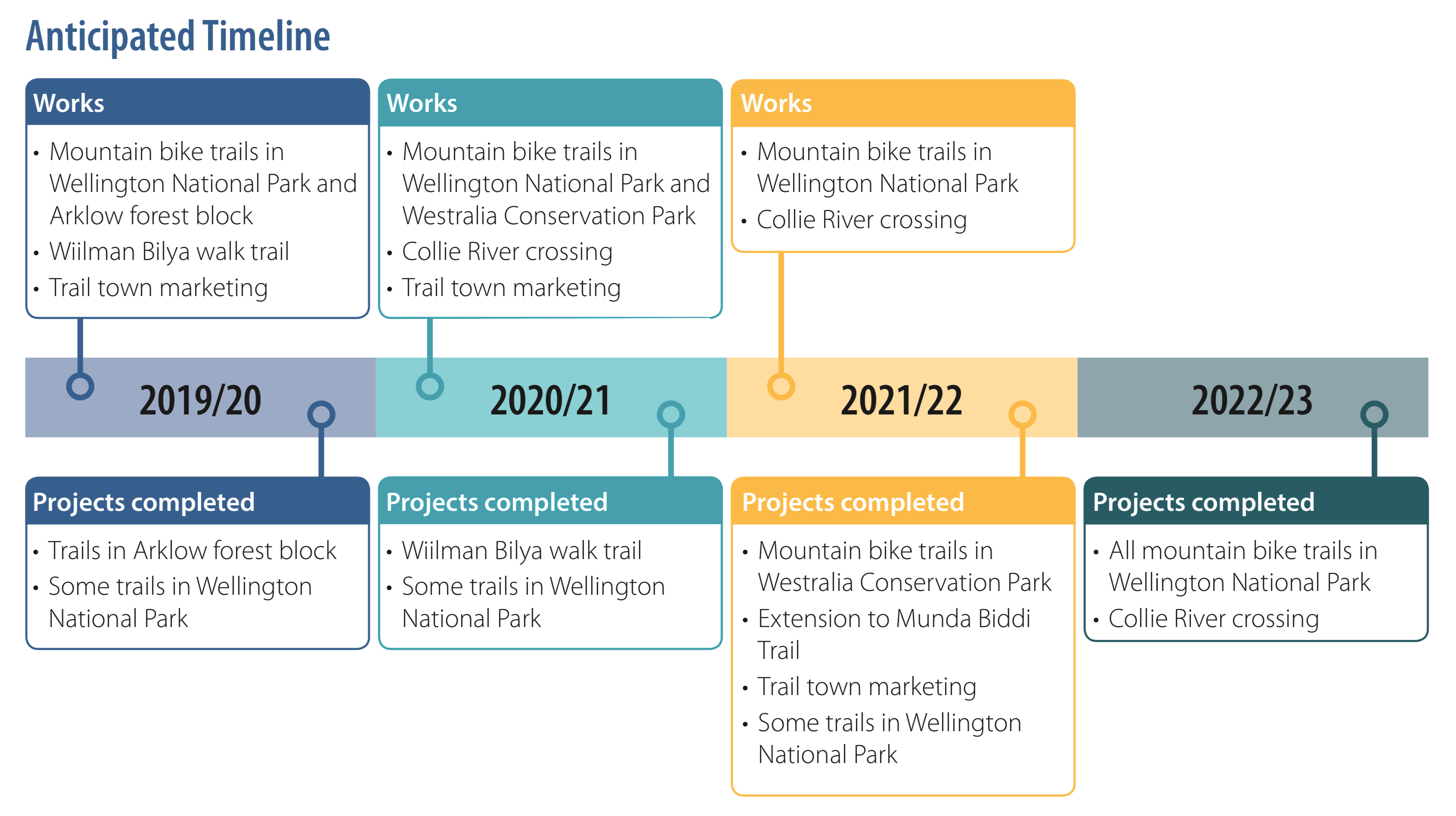
ENVIRONMENTAL and CULTURAL CONSIDERATIONS
The diverse vegetation, river valleys and granite outcrops around Collie are a very special place, being culturally significant to the Nyoongar traditional owners, and to the wider community. The forest habitats are also home to a number of endangered species including the woylie.
All trails being built as part of the Collie Adventure Trails initiative will be planned and developed in accordance with the eight-step Trail Development Process.
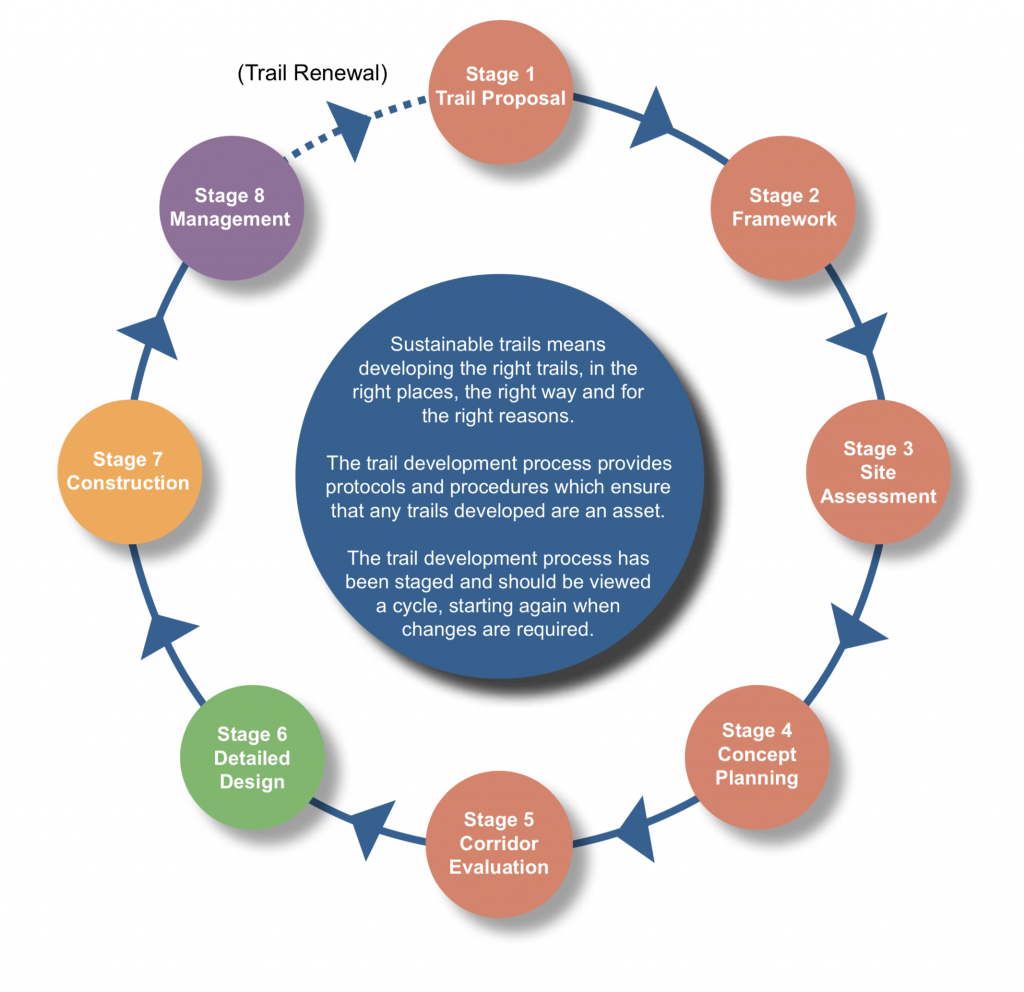
Environmental and cultural considerations such as Phytophthora dieback, flora, fauna and heritage (both Aboriginal and European) will be assessed in detail, with the trails designed to minimise impacts on these important values.
Trails will be built using best practice construction techniques to ensure the highest quality, maximum sustainability, minimal maintenance and maximum fun!
TOURISM AND ECONOMIC BENEFITS
In April 2019, a significant step in realising Collie’s potential as a premier trail town was taken, with the announcement of the Collie Adventure Trails initiative, which will see $10 million being invested in mountain bike and hiking trails for the area.
A key outcome of this initiative is to grow and diversify Collie’s economy, create jobs across a range of industries by attracting new visitors and encouraging new businesses, and maintain a vibrant community.
It is anticipated that the trails will be used by:
- Local residents,
- Visitors to the region seeking nature-based and adventure tourism opportunities and,
- State, national and international mountain bike riders.
The construction of the trails and an ‘adventure hub’ in Collie is expected to create up to 160 jobs over three years. It is estimated that 33 jobs will be created in the tourism sector to cater to the 12,000 additional visitors to the area each year. Financial modelling predicts that these visitors will inject $3.8 million per year into Collie, which will generate $6.9 million per year in the wider community.
This increased visitation will build on the already rising number of people travelling to Wellington National Park to enjoy recently upgraded campground facilities, toilets, barbecue shelters, roads, paths and day-use areas, as well as ‘glamping’ opportunities. These facilities are the result of a $5.2 million investment in the Collie–Wellington area since 2013–14. A further $6.8 million is earmarked to improve tourist roads in the area and establish Lake Kepwari east of Collie as a water-based recreation destination.
FREQUENTLY ASKED QUESTIONS
All construction works for the trails and supporting infrastructure will be tendered by DBCA in accordance with standard State government procurement processes.
Where possible, local content preferences will be added to procurement processes.
All construction works for the trails and supporting infrastructure will be tendered by DBCA in accordance with standard State government procurement processes.
Where possible, local content preferences will be added to procurement processes.
It is conservatively estimated the Collie Adventure Trails project will bring an additional 12,000 visitors annually to the area.
This equates to approximately $3.8 million in economic spend within the area annually, and presents a significant opportunity for existing businesses to expand, and new business to be created, such as commercial bike hire, and shuttle services between the trail networks.
Throughout the project, opportunities will be provided for local businesses to be involved in the project. As more trails are built and the project moves toward an operational phase, workshops will be conducted to help local businesses get ‘trail ready’.
The primary trailhead will be located in Collie. Secondary trailheads will be provided at various locations on the trail networks, including the Kiosk in Wellington National Park.
All trails will be planned and designed following the eight-step Trail Development Process to ensure environmental and heritage values are protected.
DBCA will consult closely with traditional owners in the planning and construction of new trails and facilities. The trail network is being developed to protect identified heritage sites and does not impact on them.
A sustainable business model will be developed and implemented at the same time as the trails are developed. DBCA will work with local government, volunteers and the MTB community to implement the model and maintain the trails.
The trails will primarily be for mountain bike use only, however they may be used for trail running events.
Management of the project will be led by DBCA with support from a reference group made up of representatives from: the Shire of Collie; Tourism WA; the Department of Local Government, Sport and Cultural Industries; Collie Chamber of Commerce; Department of Premier and Cabinet; and the South West Development Commission. Advice and input will also be sought through Westcycle and the Collie Mountain Bike Club.
The Collie Adventure Trails are expected to create the following community benefits:
- Create world class visitor attractions in the South West region by establishing nationally significant mountain bike trail networks that will grow and sustain the tourism economy;
- Create marketable trail products that appeal to a broad cross section of tourists while also catering for trail enthusiasts;
- Establish marketable mountain bike trail products that enable the holding of national and international events;
- Deliver an integrated tourism experience across the region that will increase the total number of visitors to the region, increase the number of repeat visits, and extend the length of stay;
- Stimulate local tourism economies in the region (e.g. accommodation, retail and hospitality);
- Establish new businesses after construction that support adventure and eco-tourism trail experiences;
- Raise local, State, national and international recognition and awareness of the region’s natural amenities, heritage, adventure and eco-tourism assets and its outstanding biodiversity;
- Provide trail facilities that will improve the lifestyle and community amenity for the South West region residents;
- Establish best practice trail development and management that minimises impact on the natural environment;
- During construction, direct employment and flow-on permanent employment post-construction for tourism businesses, accommodation and associated service businesses and trail maintenance;
- Post construction potential to stimulate permanent ongoing employment through businesses supporting the activity and other visitor services industries such as bike hire, trail maintenance, accommodation and hospitality;
- A level of rider accessibility, challenge and enjoyment consistent with rider expectations and needs;
- Improved visitor satisfaction in parks and towns where trail infrastructure is established;
- Develop a sense of ownership by local trails groups and volunteers to support ongoing trail maintenance;
- Facilitate the aspirations of the local Aboriginal community in terms of training, employment, heritage interpretation and business development; and
- Potential for development of a range of mobile and web-based applications and online resources for trail users.
While much of the work of this initiative will be in developing the trails themselves, a key aspect will be to establish Collie as a ‘trail town’. As home to the primary trail town facilities, Collie will house a bike wash, bike racks and storage, lockers, bike hire and repair facilities, trail information, toilets and showers.
No trails are currently being planned for private land.
The trails will allow greater community access to engage with the natural environment, and therefore learn about it and value it. Along the trails there will be innovative education and interpretation signage and opportunities to support environmental and cultural awareness and advocacy.
Mountain bike trails will generally be between 600mm and 1200mm wide and naturally surfaced. In order to minimise erosion and future maintenance, sections of the trail network may have to be hardened, using materials such as gravel, rock and stabilising treatments.
No walking trails are planned to be closed, however there may be sections of dual-purpose trail required in high conservation areas of Wellington National Park and Westralia Conservation Park. DBCA’s trail planning aims to ensure that both walking trails and proposed mountain bike trails co-exist respectfully and safely.
GET IN TOUCH
Want to know more about the project, or want to leave some feedback? We’d love to hear from you!

© Trails WA Projects 2022

